#can we all just agree that unisex bathrooms is the least complicated for everyone
Explore tagged Tumblr posts
Text
I'm seriously trying and failing to figure out which of them is even supposed to be which. Am I supposed to be like "ah, left one is wider at the base, that looks like a skirt, only girls can wear skirts (as we all know), must be the ladies'" or am I supposed to go "ah, left one has its 'legs' spread, only boys can sit with their legs spread (as we all know), must be the gents'"?
Genuinely I can't decide which outdated stereotype is the more likely answer here 😂
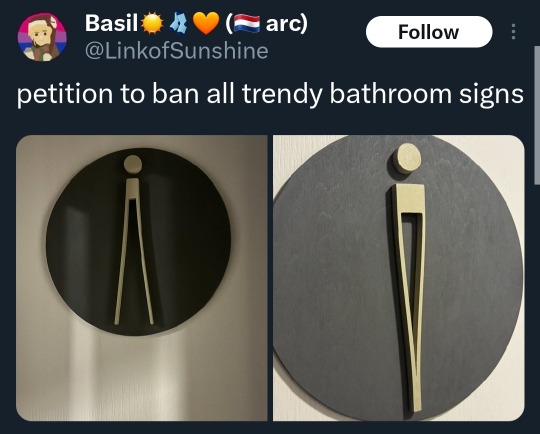

#gender#gendered bathrooms#can we all just agree that unisex bathrooms is the least complicated for everyone#because this is just stupid
83K notes
·
View notes
Text
Seeing Pink?
Originally Published on August 27, 2015 on Eichy Says
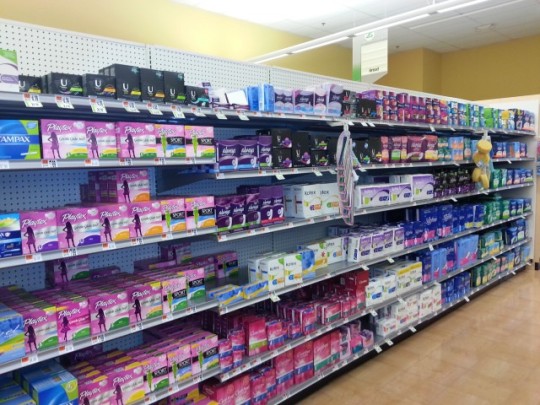
For ages, misandrists within our society have been trying to find ways to "prove" that men categorically have life "easier" than women. And, in certain areas of human culture, women do indeed face greater institutional sexism: employment discrimination, child-rearing, and electoral politics are a few examples.
Among the most common statistics is how American women earn, on average, 77 cents for every dollar earned by American men.
But a new buzzworthy topic of sexism in news stories has been the so-called "Pink Tax" -- the statistical reality that women, on average, pay more than men do for personal grooming and hygiene products.

Feminist researcher/journalist Elizabeth Plank comments on this phenomenon by observing:
Companies also charge more because they know that female consumers will buy these products, due in no small part to savvy marketing teaching consumers that certain products are just for women or men, but not both. As a result, women may not consider purchasing a product targeted towards men as an option, even if it costs less.
Plank conducted an experiment where she, along with a male counterpart, each shopped at the same store -- with Plank purchasing only "women's products" while her male research partner purchased equivalent products marketed to men.
After shopping for "female-vs.-male" incarnations of body wash, razors, deodorant, shaving cream, and wrinkle cream, Plank ended up paying 14% more than her male counterpart did.

On average, it's estimated that women will pay approximately $1,400 more than men per year for products that serve identical purposes. Part of this trend is facilitated by the practice of stores displaying "men's products" and "women's products" in separate areas, to make price-comparing more difficult for the average shopper.
Yet, Ian Parkman, an assistant professor of marketing at the University of Portland, points out how men tend to be creatures of habit whereas women may experiment more often -- valuing the "experiential" aspects of shopping, or being more likely to want to treat themselves.

Clearly, these cultural differences may contribute to price differences between "men's products" and "women's products" that are perceived to be unfair.
However, sometimes the sexism is blatant. For instance, Old Navy was publicly exposed when caught charging higher costs for plus-sized women's clothing compared to plus-sized men's clothing.
Similarly, dry-cleaning costs are estimated to be 73% higher when you compare a shirt marketed to a woman with one marketed to a man.
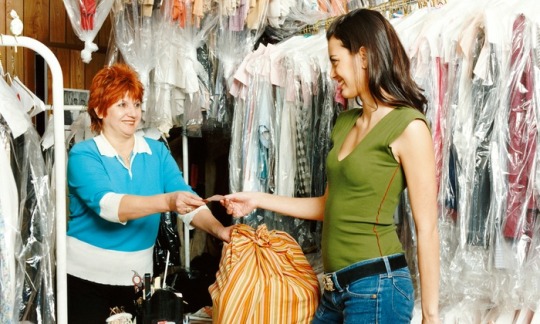
But, as pointed out by Steven Horwitz -- the Charles A. Dana Professor of Economics at St. Lawrence University -- a lot of subjectivity can go into some consumer-based comparisons.
After all, says Horwitz, women's haircuts are frequently more complicated than those received by men. Men are less likely than women to get their hair permed, straightened, or highlighted -- and those males who do choose more complex hairstyles will absolutely pay more than those of their "bros" who opt for a buzz-cut or a simple trim.
In that same vein, dry-cleaning costs might be higher for some women's clothing because the fabric worn by females is more intricate than that worn by males.

Neutrogena makes the claim that its facial moisturizer is priced 10% higher for a women's version than a men's version due to packaging, formula, and retailer's discretion. The company's honesty might be suspect...but it's certainly within the realm of possibility.
And are cosmetics really a necessity? The truth is that women are far likelier to wear makeup, eyeliner, lipstick, or blush than men are.
Women may claim they are doing this to "please" their husbands or boyfriends (or potential significant others)...but that strategy is purely a social choice on the part of those females.

Ladies -- if a man (or a lesbian or bisexual woman) is less likely to want to date/marry you due to the absence of cosmetics etched upon your skin...then is he/she REALLY the type of person you want as a romantic partner?
If your answer is yes, then that's your choice. Don't take it out on the rest of us.
So, yes, clearly there are companies exploiting women due to their willingness to pay more for hygienic/grooming products. Yet, rarely do we hear any rational solutions for rectifying this disparity. Even if male and female salaries were exactly the same for equal work 100% of the time...the price-gouging of "female-vs.-male" products would still persist.

Basically, we just hear females decrying the "Pink Tax" (again, proposing no feasible strategies to alleviate it) -- and then standing up on soapboxes while declaring to the men of America: "You'd better appreciate how we're spending so much of our money to look good for you!"
Back to the practical arguments: some razors are better equipped for leg-shaving than for face-shaving. Women are more likely to use razors for getting rid of leg hair. Men are more likely to use razors for getting rid of facial hair.
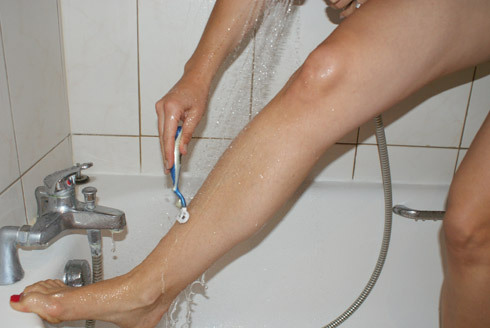
If you really like a certain special lady, but whether or not she shaves her legs is a deal-breaker for you...then you could be missing out on a great relationship. Bitch and moan at your own risk.
If you really like a certain special gentleman, but whether or not he shaves his chin/cheeks is a deal-breaker for you...then you could be missing out on a great relationship. I'll repeat: bitch and moan at your own risk.
So what's the solution?
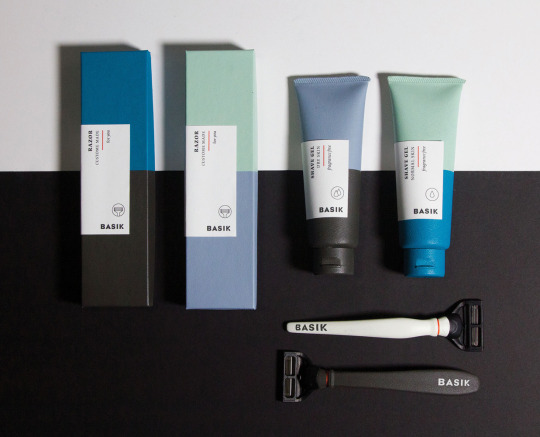
Well, a very slowly-but-gradually growing trend is the availability of “unisex” products. Gender-neutral deodorant. Gender-neutral soaps. Gender-neutral grooming products. Gender-neutral razors.
But these products are rare -- and exorbitantly-priced online. In order for it to be profitable for more stores to carry gender-neutral products, there needs to be greater consumer demand for them.
As an alternative, you can shop for bathroom and beauty supplies at "bargain outlets" such as The Dollar Tree or The 99 Cent Store. Most of the soaps, razors, body washes, shampoos, conditioners, moisturizers, deodorants, and compact cosmetics available in these stores are inherently gender-neutral...and cheaper than the equivalent products sold by mainstream retailers.

If you're a consumer who values bells n' whistles or frills, that's fine. Just don't expect everyone to view you as a martyr for shelling out the extra cash to buy them for yourselves.
And yes, that can include those higher-priced items that this "Pink Tax" makes reference to.
Sorry, ladies -- if you want the extra flowery scents or pretty colors, you're going to have to pay more for them.

Complaining about it is akin to women who (rightfully) criticize "beauty" magazines that exploit female bodies by prominently displaying their scantily-clad bodies...yet, many of those same women who are doing the complaining proceed to turn around and also still CHOOSE to buy those magazines.
If I don't like the food at a restaurant (or disagree with the restaurant's political activities), then I'm simply not going to dine there.
This shouldn't be some symbolic quest to wear one's sash of victimhood. It reminds me of people who brag about how they ditched their cable subscription in favor of relying exclusively on Netflix, Hulu, or other online streaming services. Great, so you're saving money after having been "ripped off" for years upon years...what do you want, a statue erected in your honor in front of DirecTV's headquarters?

If I choose to run the air-conditioning in my home (rather than opening a window to cool down the house), then I have no place complaining about my electricity bill.
If I choose to run the furnace in my home during the winter (rather than cuddling up in a toasty blanket), then I have no place complaining about my gas bill.
If I choose to buy an expensive bottle of sparkling cider (rather than making myself a homemade sparkling drink using filtered water, some club soda, and a dash of citrus), then I have no place complaining about my higher grocery bill.
If I choose to have bacon or tomatoes added to my classic grilled cheese sandwich, then I have no place complaining about my higher restaurant bill.

However, I do agree with the idea of public price-relief for at least one consumer-based item where women are being gouged in the checkout line: as proposed by feminist author/blogger Jessica Valenti, tampons and sanitary napkins should be free -- either covered by insurance the same way Viagra is for men, or subsidized by the government somehow. After all, women have no choice when it comes to enduring menstrual cycles...so they shouldn't be financially punished for it.
Nevertheless, to embrace some inflated doctrine of "neofeminism" -- alleging that women are "doing men a favor" by spending more of their hard-earned money on pricier fashion/beauty commodities -- is a ridiculous notion. It's completely eschewing principles of personal responsibility and good judgment.

It's also a slap in the face to women who are the victims of actual gender-based discrimination or crimes: domestic violence (notably in heterosexual relationships), sexual harassment from males (or from petty females inflamed with jealous or spite), salary inequities, misogynistic child custody laws, and educational segregation.
Finally, framing this "Pink Tax" as a severe form of institutional misogyny is presumptuous on its face -- as it assumes that women should somehow continue to be expected to adhere to social norms of "beauty" and "grooming" that not all women may actually feel comfortable embracing.

Instead of whining about disproportionate commercial prices for women within a heterosexist, neofeminist existing framework...why not shift the discussion altogether, to de-stigmatize social expectations for girls and women who don't want to slather themselves with cosmetics, perfume, or designer fabric?
Given all of the serious injustices faced by women in the modern world...those who are crusading against the "Pink Tax" would be wise to reevaluate their priorities.
0 notes